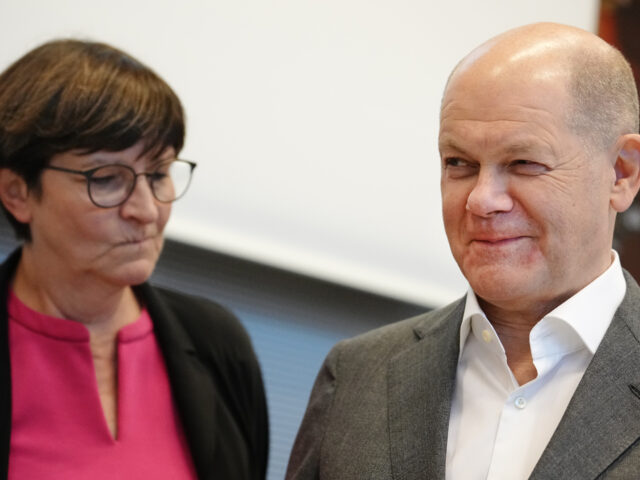The leader of the left-wing Social Democrat Party (SPD) of German Chancellor Olaf Scholz has suggested banning the Alternative for Germany (AfD) party amid the right-wing populist party’s surge in the polls.
SPD leader Saskia Esken said this week that an outright ban of the AfD should not be off the table to protect democracy, claiming that the party uses “every topic to incite people” which she said is “clearly anti-democratic”.
“Such a party ban is rightly subject to high hurdles. But I am convinced that we should keep reviewing it,” Esken told the German dpa news agency. “It is important that we talk about banning the AfD and that voters are shaken up.”
The left-wing leader’s comments come as the AfD has overtaken her party — which also happens to be the party of Chancellor Olaf Scholz — in the polls, with the AfD becoming the most-supported single party in the country and only lags behind the combination of the Christian Democrat Union (CDU) and the Christian Social Union in Bavaria (CSU), which given their strong partnership are typically counted in the polls together.
At present, the AfD, on the back of rising resentment over the failures of the past decade of open borders policies in Germany, stands at 23 per cent in the polls, compared to the SPD at 14.8 per cent, and its government coalition partners, the Greens at 13 per cent, and the Free Democratic Party (FDP).
In 2023, the populist party saw its support translate into regional election wins, having won a mayoral election, a lord mayor election, and secured its first-ever governing post at the district administrator level in Sonneberg.
This year, the AfD will be looking to build on these successes and is currently predicted to win the state elections in Brandenburg, Saxony, and Thuringia. Should the party secure enough votes to form an absolute majority in one of those states, they would be in a position to appoint the first state premier — a post similar to governor in the United States — since the party was formed in 2013.
The rise of the AfD has come with massive pushback from the establishment in Berlin, however, with the Federal Office for the Protection of the Constitution branding the party as a “suspected” right-wing extremist party. Meanwhile, the party’s state branches in Saxony, Saxony-Anhalt, and Thuringia have been outright categorised as right-wing extremists.
Regional party outposts have been accused of holding racist views or vying to change the constitution of Germany, which is held up as a near-sacred document given its implementation following the Second World War.
The SPD is not alone in suggesting a ban of the AfD, with the government-funded German Institute for Human Rights (DIMR) telling lawmakers in June that a ban against the AfD would be justified, claiming that the party stands against the “free democratic basic order”. The DIMR also claimed that the political ideology of the AfD is “based on the tyranny of National Socialism”, an assertion that the party stridently rejects.
Last week, the Social Democrat interior minister of Thuringinia, Georg Maier called for an amendment to the state’s constitution to prevent the AfD from coming to power in the region, by taking away the right of the largest party in an election to automatically put forward a state premier, thereby enabling smaller parties to band together to prevent the AfD from taking the seat, as it is predicted to do.
Responding to the move, co-chairman of the AfD in Thuringia, Stefan Möller said: “If you can’t win the election, you just have to change the rules. Left-wing extremists call this democracy.”

COMMENTS
Please let us know if you're having issues with commenting.